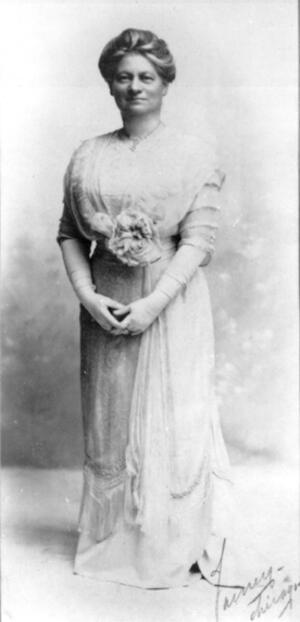Death of Hannah Greenebaum Solomon, First President of the National Council of Jewish Women (NCJW)
Before women earned the right to vote. Before the widespread acceptance and practice of the religious education of Jewish women. Before juvenile courts, education of the immigrant population, and the recognition of the values of social reform – there was Hannah Greenebaum Solomon (1858 – 1942).
Founder and first president of the National Council of Jewish Women in 1893, Hannah Solomon represented a generation of middle-class Jewish women who paved the road for women’s voice in the public affairs of the Jewish community. A consummate leader and administrator, Solomon forged her own career out of voluntarism and social reform, believing that "woman's sphere is the whole wide world."
In her secular as well as her Jewish activities, Solomon used her commitment to home and motherhood to redefine proper female behavior and reshape the boundaries between the public and private spheres. Uniting motherhood and activism to redefine women’s stake in the world, she wrote, "Who is this new woman?...She is the woman who dares to go into the world and do what her convictions demand. She is the woman who stays at home in the smallest, narrowest circle, foregoing all the world may offer to her, if there her duty lies..."
During her tenure as NCJW president (1893–1905), Solomon founded the Bureau of Personal Service, an agency that served Jewish immigrants in Chicago’s seventh ward. Established in 1896 with funds from the Chicago NCJW section, the bureau provided family counseling, supervised loan programs, worked to improve housing conditions, and directed new immigrants to appropriate social service organizations. Many NCJW members volunteered at the bureau’s agencies, acting as social workers, visiting prisons, and providing instruction in the English language and American mores. Hannah Solomon chaired the Bureau of Personal Service until 1910, when it became part of Chicago’s Associated Jewish Charities, a citywide organization coordinating Jewish philanthropy. Like so many women’s projects, the volunteer programs of the bureau and the NCJW predated the establishment of a coordinated Jewish philanthropic effort in the city.
The Associated Jewish Charities was founded in 1900, several years after the bureau and NCJW had pioneered volunteer social service programs. Through her presidency of the NCJW and directorship of the bureau, Solomon established herself as one of the premier community leaders of Chicago. She served for years as the only woman on the executive board of the Associated Jewish Charities. Solomon’s work placed her squarely in the middle of an active social service network that included both Jewish and gentile agencies. She maintained close connections to Jane Addams and Hull House, the Maxwell Street Settlement, and the Chicago Civic Federation.
In 1905, she began working with the Illinois Industrial School for Girls, later renamed the Park Ridge School for Girls, which became one of Solomon’s most cherished projects. She continued to hold her positions on the boards of the Associated Jewish Charities, the Chicago Civic Federation, and the Illinois Federation of Women’s Clubs, and to participate as a leader in several other organizations. As a prominent civic reformer and a representative of the Women’s City Club, she investigated problems with Chicago’s waste disposal system.
Under her leadership, the Chicago NCJW chapter created a Sabbath school for girls. Solomon and the NCJW considered it particularly important to inculcate Jewish values in young girls and provide them with educational opportunities. The school eventually became so popular that, like so may other ventures initially sponsored by the NCJW, it became absorbed within a larger Jewish institution, adopted by Temple Sinai as part of its regular educational program. In establishing Jewish communal projects as well as building secular organizations, Solomon always considered philanthropy, education, and social service as an extension of religious obligation.
Solomon saw commitment to social welfare as her responsibility—as a Jew, an American, and a woman. She believed no life was complete which had not taken light "from the bright places in its own and transmitted [it] into homes of sorrow and gloom, dividing the fullness of earth with those whose portions are nothingness."
The National Council of Jewish Women still evokes Solomon's words as an inspiration to "[improve] the quality of life for women, children, and families … by safeguarding individual rights and freedoms."



